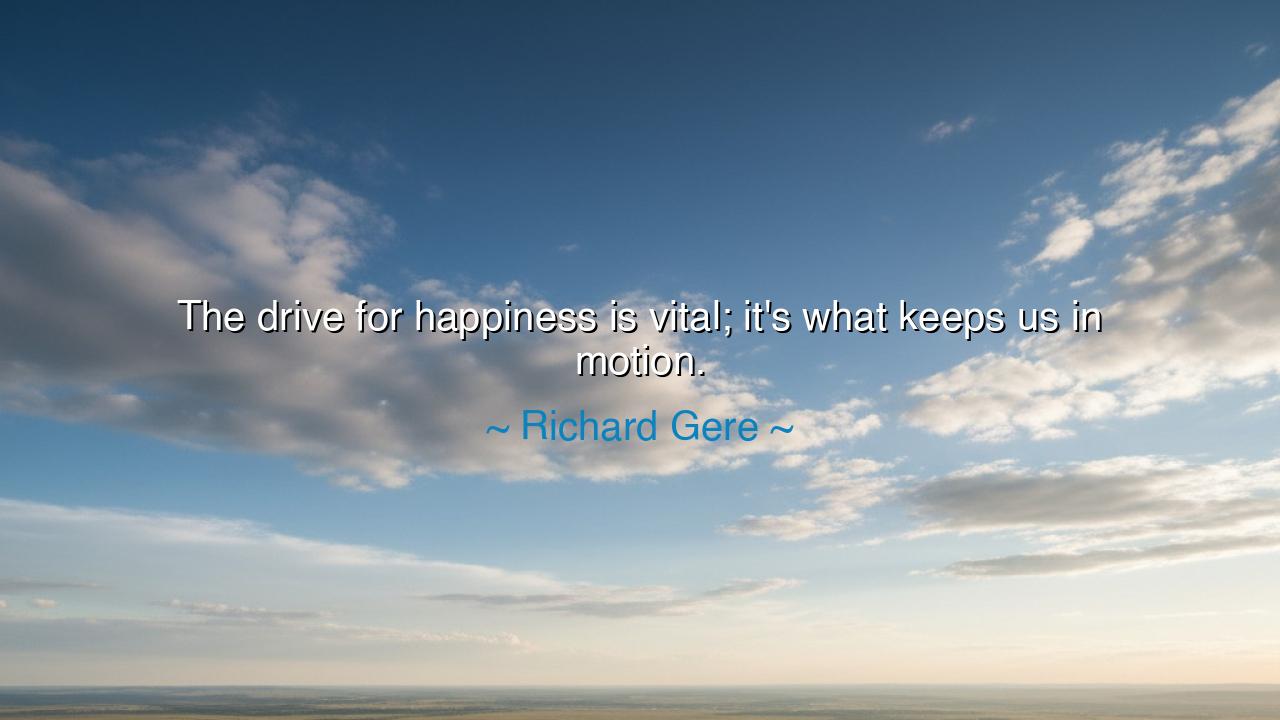
The drive for happiness is vital; it's what keeps us in motion.






“The drive for happiness is vital; it’s what keeps us in motion.” Thus spoke Richard Gere, a seeker of both inner stillness and worldly meaning, a man who has walked the twin paths of fame and spiritual awakening. In this simple yet profound declaration, he reveals one of the deepest truths of existence — that the longing for happiness is not mere indulgence, but the very force of life itself. It is the flame that stirs the human heart to rise each morning, to endure suffering, to strive, to dream, and to love again. Without this inner drive, the soul stagnates, and the journey of becoming ceases.
The ancients understood this well. They taught that every creature moves toward what it believes will bring joy — that the longing for happiness is the pulse of creation itself. From the humblest farmer tilling his soil to the philosopher searching for truth, all are bound by the same unseen thread: the desire to reach a state of contentment, of harmony between the inner and outer worlds. In this sense, Gere’s words echo the teachings of Aristotle, who called happiness — eudaimonia — the highest goal of human life. But while the philosopher spoke of it as the final destination, Gere reminds us of its living, breathing nature: that the pursuit itself, the constant motion toward joy, is what keeps us alive in spirit.
To understand this fully, one must look not only at moments of triumph, but at moments of struggle. For it is in hardship that the drive for happiness reveals its power. Consider the story of Nelson Mandela, who spent twenty-seven years imprisoned for his belief in justice. What kept his spirit unbroken through the long dark years? It was the unwavering hope for a better world — the motion of his heart toward light, even when all else was shadow. Happiness, for him, was not a fleeting pleasure but a vision of peace and dignity for his people. That vision sustained him; it gave his suffering purpose, and purpose, in turn, gave him life.
So too in our smaller lives, this truth endures. When the burdens of existence press heavily upon us — when love is lost, when dreams falter, when the road seems endless — it is the faint but persistent call of happiness that draws us forward. Even in despair, some part of the human soul continues to reach for warmth, for connection, for meaning. It is this reaching, this eternal striving, that defines us. For as Gere reminds us, to lose the drive for happiness is to lose the will to move, to grow, to live.
And yet, wisdom lies in understanding that happiness is not a possession to be seized, but a journey to be walked. The one who chases it blindly, mistaking pleasure for joy, finds only exhaustion. But the one who seeks it with awareness — who finds contentment in the act of seeking itself — becomes like a river, flowing ever onward, nourished by its own motion. Thus, happiness is not found at the end of the path, but in the walking of it.
Richard Gere, shaped by his study of Buddhism, speaks not of worldly desire but of the spiritual energy that sustains all life. To move toward happiness is to align oneself with the rhythm of the universe — to participate in creation, in compassion, in the renewal of being. It is not the restless craving for more, but the courageous movement toward balance, peace, and understanding. In this, Gere’s words carry both a challenge and a comfort: that to seek happiness is not selfish, but sacred.
The lesson, then, is this: never cease moving toward joy. Let the hunger for light guide your steps, even through darkness. When weariness tempts you to stillness, remember that motion is life. Seek happiness not in possessions or praise, but in growth — in learning, in loving, in serving, in becoming. Each act of kindness, each moment of gratitude, each courageous breath is a step on that eternal journey.
So, my child, carry Gere’s wisdom as a lantern in your heart: the drive for happiness is not vanity, but vitality. It is the sacred wind that fills your sails and keeps you moving across the seas of time. Guard it, nurture it, and let it lead you always toward that horizon where peace, purpose, and joy meet — for there lies the true homeland of the soul.






AAdministratorAdministrator
Welcome, honored guests. Please leave a comment, we will respond soon